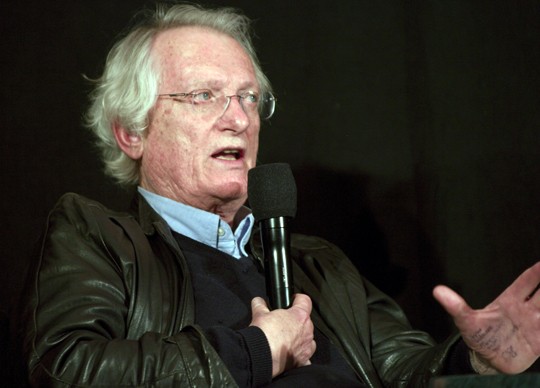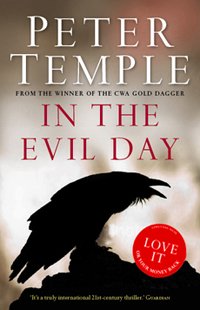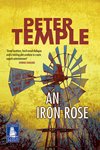 Imagine prose written by a journalist who has been cudgeled by hard-nosed editors into saying as much as possible in the fewest words. Then add the imagination of a poet and the compassionate humility of a medieval saint. Swirl these strands together and you have the near miracle that is Peter Temple. He was born in South Africa in 1946, but moved to Australia, where he worked as a journalist and later as a lecturer. His novels have put him in a class of his own in terms of Australian crime fiction – he has five Ned Kelly Awards to his name – and the country itself is key to his work.
Imagine prose written by a journalist who has been cudgeled by hard-nosed editors into saying as much as possible in the fewest words. Then add the imagination of a poet and the compassionate humility of a medieval saint. Swirl these strands together and you have the near miracle that is Peter Temple. He was born in South Africa in 1946, but moved to Australia, where he worked as a journalist and later as a lecturer. His novels have put him in a class of his own in terms of Australian crime fiction – he has five Ned Kelly Awards to his name – and the country itself is key to his work.
The beating heart of Temple’s novels is Melbourne. It is central to the Frank Calder and Jack Irish stories. Even in the Mac Faraday and Joe Cashin books, where the action takes place many miles distant, the city is a constant presence, a place to return to or escape from, a very subtle but audible hum in the background.
In Truth, Inspector Stephen Villani has to cope with death and corruption among Melbourne’s rich set, as well as a racist problem in a country town. This is a Melbourne in transition. A city speckled with run-down pubs, hardly changed since the 1950s, and peopled with grizzled footie supporters who nurse their beers while raging against the dying of the light. Yet, somewhere down the street, there are a dozen bars with a dozen designer flavours of coffee, instant wi-fi and a cocktail for every occasion.
Melbourne is a city where the rich Catholic heritage of Irish and Italian migrants struggles to maintain its identity in the teeth of a wind of change from Asia and the Pacific. A city where the trams clatter onwards and outwards from the sophisticated Central Business District to the mundane bungalow-lined streets of Brunswick and Coburg.
 In The Evil Day is the only Peter Temple book where he strays far from home – to Europe. An ex-Beirut hostage is eking out an existence working in surveillance in Hamburg, but becomes involved with a beautiful investigative journalist in London, and an unscrupulous mercenary. Here, John Anselm is a well-drawn central character, and the cosmopolitan backgrounds are convincing, but this is evidence only of Temple’s own wide ranging experience and his skill as a writer. Aficionados will enjoy the diversion, but long for a return to the rain-soaked and dank streets of Melbourne.
In The Evil Day is the only Peter Temple book where he strays far from home – to Europe. An ex-Beirut hostage is eking out an existence working in surveillance in Hamburg, but becomes involved with a beautiful investigative journalist in London, and an unscrupulous mercenary. Here, John Anselm is a well-drawn central character, and the cosmopolitan backgrounds are convincing, but this is evidence only of Temple’s own wide ranging experience and his skill as a writer. Aficionados will enjoy the diversion, but long for a return to the rain-soaked and dank streets of Melbourne.
Rain-soaked? Dank? But surely this is Australia? We demand heat, flies, beaches and beer! The beer you will get, but Temple knows that between May and October, Victoria’s capital can be a bleak and chilly place. Jack Irish, perhaps Temple’s best known protagonist, usually has the heating turned up full in his battered car, and often struggles to get a wood fire going in the hearth of his draughty loft. Outside, the rain slants down and the atmosphere is as cold as the hearts of the villains Irish challenges.
When he takes us a couple of hours’ drive along the highway out of Melbourne, Temple’s voice still commands attention. The deeply conservative and incestuous atmosphere of small country towns in Victoria are brilliantly captured in the standalone novels The Broken Shore and An Iron Rose.
 As a Pom who spent some years working in and around Victoria’s capital, I can assure UK readers that Temple gets his backgrounds absolutely spot on. Sometimes Melbourne can be more English than England, with its daily evensong at St Paul’s cathedral, and its exclusive gentleman’s clubs. As for Temple’s country towns, they are every bit as close-knit, suspicious and tight-lipped as he says.
As a Pom who spent some years working in and around Victoria’s capital, I can assure UK readers that Temple gets his backgrounds absolutely spot on. Sometimes Melbourne can be more English than England, with its daily evensong at St Paul’s cathedral, and its exclusive gentleman’s clubs. As for Temple’s country towns, they are every bit as close-knit, suspicious and tight-lipped as he says.
Temple’s brilliance begins and ends with the sheer quality of his writing. His terse and direct style gives him the space and time for moments of such grace and perception that he can take the breath away. Jack Irish retreats from his bleak world of failed gamblers and crooked policemen by helping out an emigré cabinet maker. This world, with its scent of exotic wood shavings, meticulous and delicate joints, and elaborate half-forgotten skills, is a fitting metaphor for Temple’s work.
Peter Temple’s books, with their main character, are: Bad Debts (1996, Jack Irish); An Iron Rose (1998, Mac Faraday); Shooting Star (1999, Frank Calder); Black Tide (1999, Jack Irish); Dead Point (2000, Jack Irish); In The Evil Day (2002, John Anselm); White Dog (2003, Jack Irish); The Broken Shore (2005, Joe Cashin); Truth (2009, Steven Villani).









When is his next one due out?
When is the next Jack Irish book to be released? I am a huge fan.
I’m not sure but I think he stopped writing them quite a while ago. If anyone knows otherwise, please do let us know.
Confession: I had never heard of Peter Temple until I picked up your book Shooting Star in a charity shop. Like you, I was also born in South Africa and also worked as a journalist. I was born a year before you and have just completed my first novel which I hope will be published, but if it isn’t so what? I can read your books.
Allow me to just say that I LOVED Shooting Star. It had great pace and I just love your punchy style of writing. Also the characters were very real and I particularly enjoyed the relationship and repartee between Calder and Orlovsky who reminded me of several Orlovskys who have crossed my path. In short, Mr Temple, I just want you to know that you have a brand new Number One fan. I am now going to try and source all your other books.
Thanks-you and here’s wishing you continued success in the future.
Ken Loots
Falmouth
Cornwall
UK